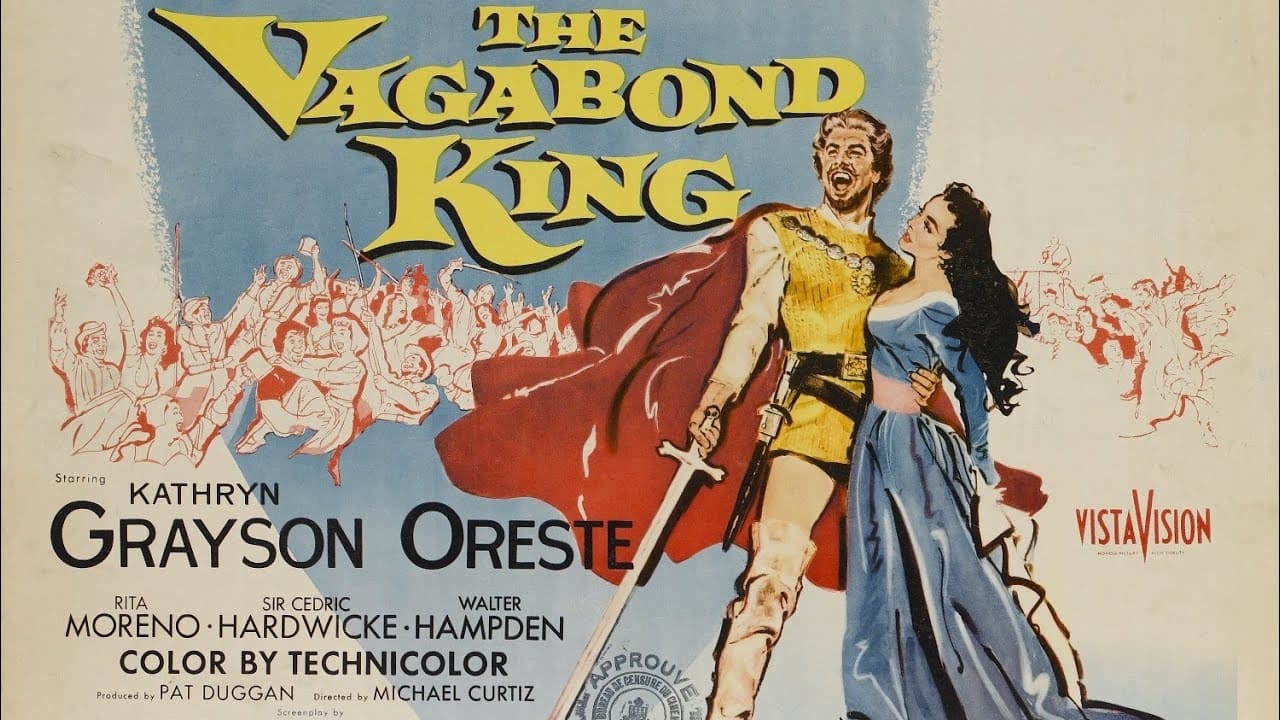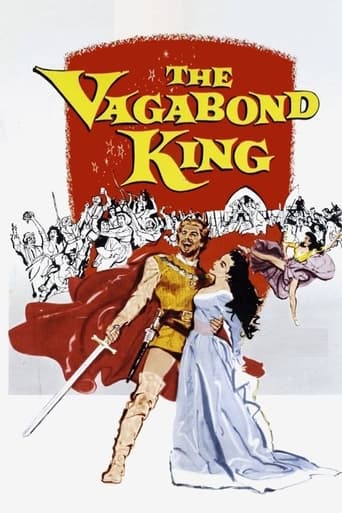



Self-important, over-dramatic, uninspired.
I saw this movie before reading any reviews, and I thought it was very funny. I was very surprised to see the overwhelmingly negative reviews this film received from critics.
View MoreAmazing worth wacthing. So good. Biased but well made with many good points.
View MoreThe film may be flawed, but its message is not.
This story of 15th century France is based on the 1925 operetta of the same name which, in turn, is based upon the 1901 romantic novel and play "If I Were King". There was a 1930 musical film version by the same title,starring Denis King and Jeanette MacDonald, which I haven't seen. There was also a 1937 non-musical version entitled "If I were King"Kathryn Grayson(as Catherine) technically was the lead female. However, her screen time was limited, mostly devoted to solos or duets with Oreste Kirkop, as Villon: the vagabond king. The younger Rita Moreno, as Hugette, a lively tavern girl, also in love with Villion, also had several songs, and danced for or with the patrons on several occasions. She was much more involved in the doings of the rabble that Villion led, and with aiding Villion when in trouble. In contrast, Catherine was of noble birth and much less animated.Historically, this much is true: There was a long standing conflict between the province of Burgundy and the French crown, Burgundy being nearly autonomous of France. Duke Charles did head Burgundy during the relevant time of the reign of Louis XI. Francois Villon was a well known poet and suspected occasional thief during this time. However, I found no information suggesting he was the leader of a dissident group of Parisians. Indeed, Louis XI seems not to have problems with rebellion. As suggested in the film, he was rather low key, dressing simply and spending much time traveling around the countryside, interacting with the common people. He initiated a system of postal roads, thus much facilitating the communications and transportation throughout France. However, the remainder of the story is purely fictional. Charles of Burgundy wasn't killed as depicted. He was killed in a foolish war with Switzerland. This effectively ended Burgundy as a separate power from the French crown.Through most of the story, the common people of Paris were opposed to Louis, apparently because their rations were too meager, and were prepared to join with Duke Charles in deposing Louis. However, Villon, their leader, decides to take the King's offer of becoming the temporary provost marshal, until Duke Charles was subdued; thereafter being hung as a thief. Villon eventually persuades the common people to support him in a surprise attack on Duke Charles' forces when he attacks the city. Instead of closing the city gates, Villon orders that they be opened, as Charles expected. Then, the combined forces of the common people and Louis's troops would hopefully crush the Duke's forces in the narrow streets.Although this was Oreste's only feature length Hollywood film, he was quite dynamic and had a great singing voice. Mario Lanza was the original choice to play Villon, but Kathryn nixed that idea, as she hated Mario. As things turned out, she didn't like Oreste any better, and audiences weren't familiar with his name. Thus, he wasn't a draw.Nine songs are included, Rudolf Frimi composing all. However, Brian Hooker was the lyricist for those songs taken from the 1925 operetta, while Johnny Burke was the lyricist for the songs composed for the present film. Oreste got the lion's share of singing assignments. However, there are several duets with Kathryn, and Rita Moreno got several songs. "Watch Out for the Devil" was accompanied by a ballet with the combined themes of the Devil and Adam and Eve.This was Kathryn's final Hollywood film, having spent most of her career with MGM, this being a Paramount film. It was also the final film for Walker Hampden, who played King Louis. As mentioned, this was Oreste Kirkop's only appearance in a feature-length film.
View MoreThe last operetta released by a major studio, and it's a pity, for this adaptation of the 1925 Rudolf Friml war horse is pretty nimble. It stars Oreste, a European tenor with the requisite high notes and a fair amount of dash, as the leader of the Paris rabble; he's quite at ease for such a major screen debut, though his accent, so apparent in song, mysteriously disappears in much of his dialogue, making one wonder if some of his lines were post-dubbed. Kathryn Grayson is her usual shrill and simpering self, albeit in a part Callas herself couldn't have made interesting, and Rita Moreno shows a lot of life and a lot of leg as Huguette. Walter Hampden, as the king, has better lines than most screen kings, and underplays them effectively. Friml, then in his mid-70s, appended his stage score with several new melodies set to adequate Johnny Burke lyrics, and one, "This Same Heart," is quite lovely. It's a studio-bound eyeful, with big sets and colorful costumes that have little to do with reality but everything to do with screen spectacle (did 15th century Parisians really don so much purple and yellow and green?), and the screenplay's pretty erudite for this genre, and Michael Curtiz ably keeps things moving (save a brief, silly Adam and Eve ballet that stops the action dead). Nobody went to it in 1956, audiences just weren't interested in operetta anymore, and they still preferred Mario Lanza to an unknown European quantity. But if you can catch this one--I did on Amazon Prime--you'll get a fine eyeful and earful of the lush melody, sweeping spectacle, and ringing romance that endeared audiences to operetta decades before.
View MoreThe Vagabond King did have the ingredients in the first place to be good. And it was. The story is rather old-fashioned and has a couple of dull spots, but I also think it is quite charming and well-meant too. You do forget that though when you see the lavish production values, the costumes, sets and photography are all gorgeous to look at, and hear the beautiful score and memorable songs that add so much to the film's quality. Song of the Vagabonds is especially catchy. The choreography and direction, apart from a couple of stage-bound moments, are otherwise skillful. The cast also add a lot. Kathryn Grayson is a charmer, Rita Moreno plays her role with both grace and fire and you can never go wrong with Vincent Price as narrator. The real surprise though was Oreste, handsome in looks, dashing in acting ability and ringingly resonant in voice, one does wonder why he like the film was forgotten afterwards. All in all, a very well-done film that is worthy of more appreciation. 8/10 Bethany Cox
View MoreFor any of you who have heard that this version of The Vagabond King is terrible, that simply isn't so. It's not the best production of a classic operetta ever brought to the screen, but it's far from terrible. The only thing that was happening was that movie musicals themselves were slowly dying out and operettas were a thing of the past. This Paramount production, a remake of the 1929 version the studio did with Dennis King and Jeanette MacDonald was really the last operetta ever done for the big screen.Today's audiences probably know the straight dramatic version of Justin Huntly McCarthy's play If I Were King, done on the silent screen by John Barrymore and for sound by Ronald Colman. Rudolf Friml's original operetta adaption premiered in 1923 on Broadway with lyrics by Brian Hooker. The main songs from that score plus several new ones composed for this version by Friml with lyrics by Johnny Burke. This was the last movie score done by Burke, he and his partner Jimmy Van Heusen had come to a parting a couple of years earlier. Nothing memorable in the new songs, but they are interpolated nicely into the story.This was a farewell for many people. This was Kathryn Grayson's last film, it was also the last for Walter Hampden who played Louis XI. It was the first and last for her leading man, Maltese tenor Oreste. Originally Paramount was going to get Mario Lanza, but Kathryn Grayson whom he did two films with and didn't get along with balked. Lanza himself was proving difficult at that time so Paramount used Oreste himself. Oreste isn't bad as the dashing Francois Villon, but public tastes were changing and operetta parts just weren't to be had any more.This romantic tale of the beggar/poet who saves Paris from invasion by the Duke of Burgandy was fashioned by Rudolf Friml and Brian Hooker into one of operetta's best loved scores. No more romantic melodies were ever written than the plaintive Some Day or the appealing duet Only A Rose. And operetta never had a better song to rouse the populace than the Song Of The Vagabonds. Friml was at his career height when he wrote this score. Rita Moreno is also in this film and she plays Hugette, the tavern girl crushing out big time on Francois Villon, who has eyes only for the royal ward Katherine Vaucelles who Grayson plays. Her number is the Waltz Hugette which enjoyed something of a revival that year because it was sung by Susan Hayward in I'll Cry Tomorrow. If you'll remember Hayward played Lillian Roth in that film and the Waltz Hugette was one of several of Roth's songs that she sang in that film and made a record of. Roth played Hugette in the 1929 Paramount version of The Vagabond King.Operetta is gone now, no one writes soaring melodies of love, romance, and derring do any more. But if you like the art form with the sappy plots and all as I do, than you can't go wrong with this version of The Vagabond King.
View More